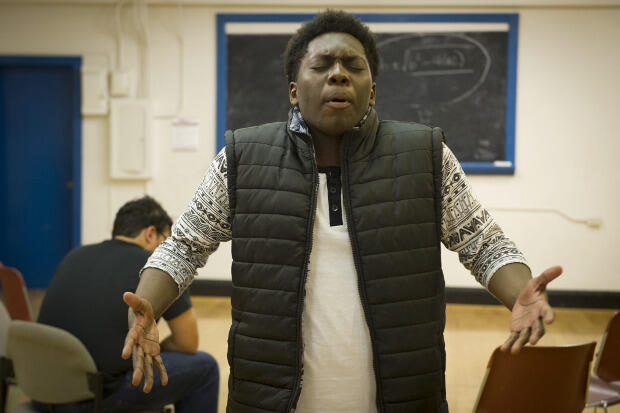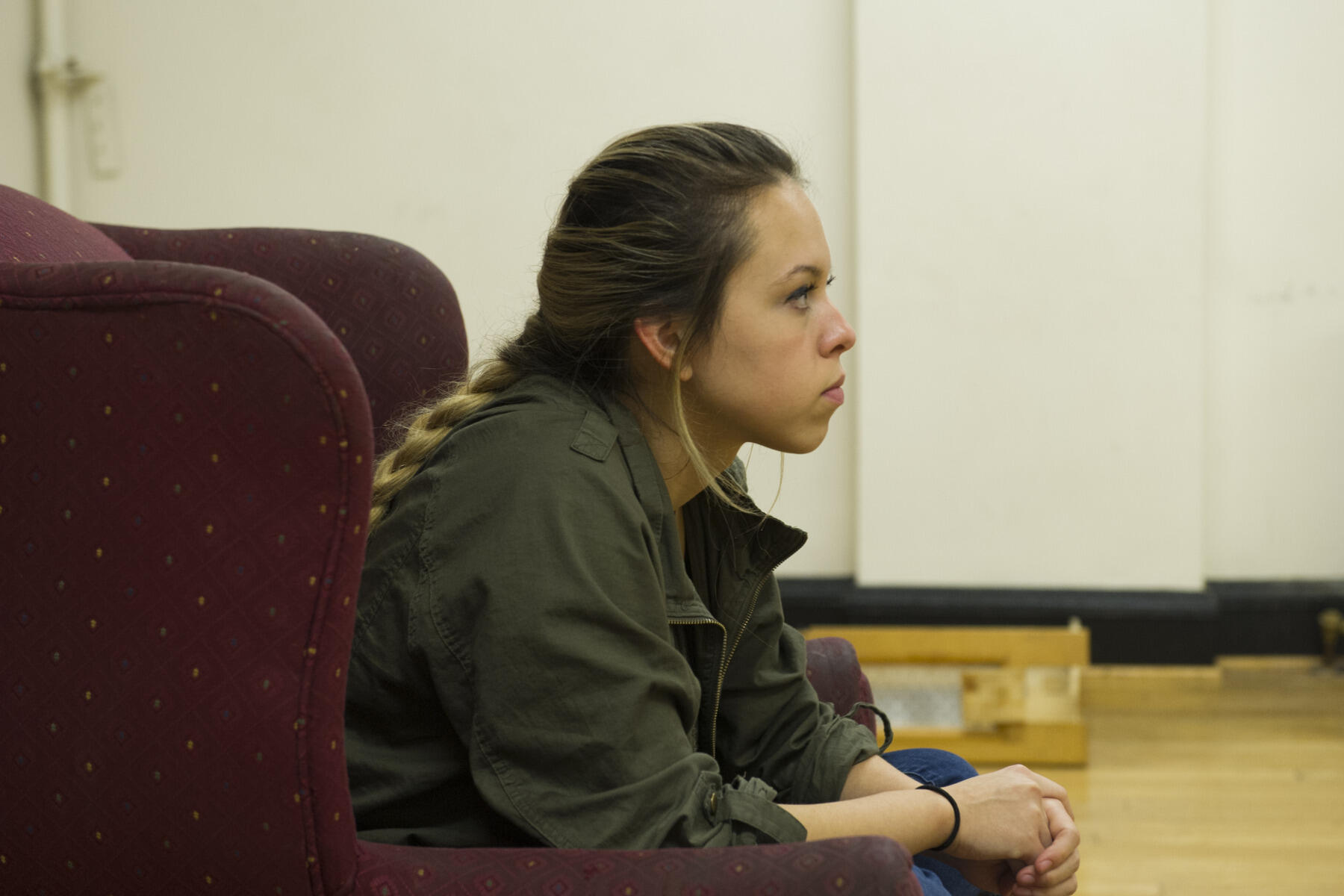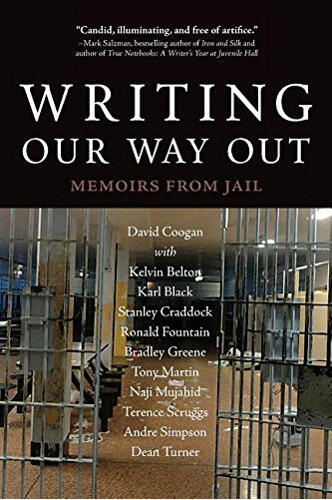
<br>Photos by Julia Rendleman/University Marketing
Dec. 7, 2016
VCU students’ stage adaptation of ‘Writing Our Way Out’ to share stories of people incarcerated in Richmond jail
Share this story
A stage adaptation of “Writing Our Way Out: Memoirs from Jail,” a book of memoirs by Virginia Commonwealth University professor David Coogan, Ph.D., and 10 people who had been incarcerated in Richmond’s jail, will be presented on Friday and Saturday at VCU’s Shafer Street Playhouse.
The monologue-driven play, starring and directed by VCU students, will tell the first-person accounts of the people featured in “Writing Our Way Out,” describing their lives, how they came to be incarcerated and their journeys toward rehabilitation.
“These are real people’s lives, and their stories that have not been appreciated,” said co-director Sarah Velasco-Kent, a sophomore theatre performance major in the School of the Arts’ Department of Theatre. “We’re hoping to give a voice to people who have been silenced and start a conversation about topics that are really, really prevalent today — mass incarceration, the pipeline to prison, the really negative connotation with being in prison and having a rap sheet and being a felon.”
The play will run Friday at 7 p.m., and then Saturday at 2 p.m. and 7 p.m. The 2 p.m. matinee on Saturday will feature a discussion with the book’s authors and the play’s cast. All showings will be free and open to the public.
This is an opportunity for education, but also for conversation.
“This is an opportunity for education, but also for conversation,” said co-director Taneasha White, a senior English major in the College of Humanities and Sciences. “We're opening the floor up for everyone to have a discourse with the cast, the authors and anyone else who chooses to be involved during the talkback on Saturday.”
“We want you to go home and look up mass incarceration, the prison industrial complex, and see how it’s affecting your country in multiple, horrifying ways,” White said. “Look up how race plays a vital role. Then go out and try to change some policies. Or go out and volunteer at your local jail or with a re-entry program like OAR or donate to Sanctuary. There’s a couple million people that we've just completely been accustomed to ignoring, and that’s a huge problem.”
The book version of “Writing Our Way Out” was published in 2015 and grew out a writing workshop taught by Coogan in the Richmond jail. That workshop led to the formation of the Open Minds program, a partnership between the Richmond City Sheriff’s Office and VCU that offers dual enrollment classes held at the Richmond City Justice Center.
Velasco-Kent and White took the Open Minds course “Writing and Social Change,” taught by Coogan — an associate professor in the Department of English — last spring, and were inspired to read “Writing Our Way Out” during the course.

They were inspired by the book and by learning alongside residents of the Richmond jail to adapt “Writing Our Way Out” as a stage production.
“Working with these men touched our hearts, and we wanted to do something to enable other people to feel the way that we did in hopes that they would also feel compelled to get involved,” White said. “It was sitting side-by-side with some of the sweetest and most intelligent people, knowing that after class was over they would be forced back in a box, listening to their stories followed by their charges, and seeing their faces on the last day of class that led us to this project. You can’t walk away from an experience like that and not be changed on some level. Luckily Sarah and I have overlapping interests, and a show seemed like the best idea to the both of us.”
The co-directors asked Coogan and the other authors of “Writing Our Way Out” for permission to adapt the book, all of whom embraced the idea.
“I wasn't sure what I would see on stage the day I gave them my blessing to put on a play through VCU’s [performance/directing lab] Shafer Alliance Laboratory Theater. I just knew I'd want to see it,” Coogan wrote recently. “I knew I’d want to see the VCU theatre student who would become Terence [Scruggs], in part, because in the 1980s Terence was a VCU student taking theater classes! I knew I'd want to see the student who would play the part of Stan [Craddock], in part, because in the 1980s, Stan lived near campus on Grace Street when that street was known more for prostitution than Panera. Not too far from VCU is where Stan learned to play the part of a hustler. How would the student from VCU learn to play that part?”

The cast was selected not only for their acting ability, Velasco-Kent said, but also for their commitment to social justice.
“They’re all involved in social activism in the community,” she said. “That was a big thing we were looking for in our cast. We wanted to cast people who didn’t just care about ‘I want to be in a show.’ This was something that they really cared about and that meant a lot to them and that they could find connections with as people.”
Velasco-Kent and White both said they would like the audience to come to be entertained, but also to engage with the issues and themes of “Writing Our Way Out.”
“I’d like [the audience] to realize that somebody who becomes incarcerated is no different than anybody else. They simply got caught. If there’s anyone in the world who can say they’ve never broken at law, they’re not being very forthright or honest,” Velasco-Kent said. “[People who are incarcerated] are not necessarily a harm to society. In many cases, they’re people who simply never got the help that they need. That’s what we, as a community, should be focusing on, rather than locking them away. We need to recognize where we’re at fault, and where we’ve failed to help people when we should have.”
Along with Coogan, “Writing Our Way Out” was authored by Scruggs, Craddock, Kelvin Belton, Karl Black, Ronald Fountain, Bradley Greene, Tony Martin, Naji Mujahid, Andre Simpson and Dean Turner.
Subscribe for free to the weekly VCU News email newsletter at http://newsletter.news.vcu.edu/ and receive a selection of stories, videos, photos, news clips and event listings in your inbox every Thursday.
Subscribe to VCU News
Subscribe to VCU News at newsletter.vcu.edu and receive a selection of stories, videos, photos, news clips and event listings in your inbox.












